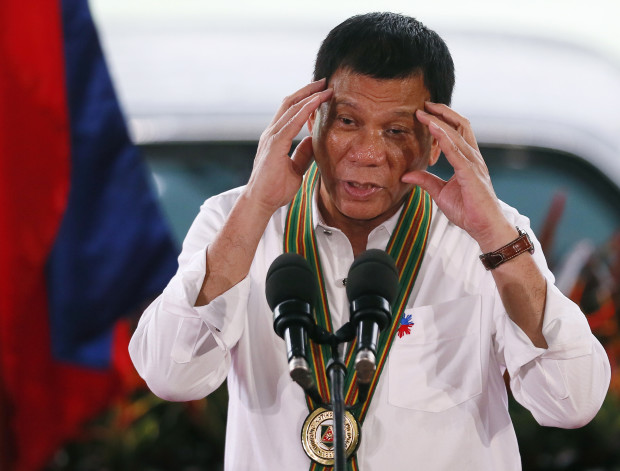Duterte may face obstacles in cutting US arms reliance
WASHINGTON—President Duterte would face major obstacles to following through on his threat to reduce purchases of US weapons in favor of Russian and Chinese arms, including retraining a military deeply accustomed to working with the United States, experts said on Tuesday.
Mr. Duterte said in speeches in Manila on Tuesday that the United States did not want to sell missiles and other weapons to the Philippines, but that Russia and China had told him they could provide them easily.
His comments were the latest in a near-daily barrage of hostility toward the United States that has raised questions about the long-standing alliance that is important to the US strategy of rebalancing its forces toward Asia and countering an assertive China.
Angered by US expressions of concern over his brutal war on drugs that has cost the lives of more than 3,400 people, Mr. Duterte has called US President Barack Obama a “son of a bitch,” threatened to call off joint military exercises with Washington and started to contrast the United States with its geopolitical rivals Russia and China.
‘Go to hell’
As American and Filipino forces opened joint Marine landing drills on Tuesday, Mr. Duterte told Obama to “go to hell.”
To the European Union, which has also criticized his bloody war on drugs, Mr. Duterte said “go to hell but you can choose purgatory because hell is full.”
In a later speech at a synagogue in Makati City, where he apologized to all Jews for comparing his war on drugs with the Holocaust, Mr. Duterte warned that he may decide to “break up with America.” It was his most serious threat so far to push relations back with Washington.
US officials have played down Mr. Duterte’s remarks, focusing instead on the decades-long alliance that they have sought to bolster in recent years in response to China’s moves to enforce its claims over the South China Sea.
“The diplomatic lines of communication between the United States and the Philippines remain open,” White House spokesperson Josh Earnest said on Tuesday.
“We have not yet received any sort of formal communication using those channels from the Filipinos government about making substantial changes to our bilateral relationship,” Earnest added.
Largest arms provider
The United States is the single largest provider of arms to the Philippines, according to figures maintained by the Stockholm International Peace Research Institute (Sipri), which tracks military expenditures globally.
The two countries have become more intertwined militarily in the last two years, holding more exercises and training, and making more US ship and aircraft visits under Obama’s shift of US military forces and diplomatic efforts toward Asia in the face of China’s rise.
The Philippines is the largest recipient of US funds in the Asia-Pacific region under the Foreign Military Financing (FMF) program, which is provided by the United States to help countries purchase American-made weapons and equipment. It received $50 million under FMF in the 2015 fiscal year.
That dependence on US weapons and systems means the Philippine military would have to retool its command-and-control structure if it wanted to switch to Chinese or Russian systems, said Richard Javad Heydarian, a professor at De La Salle University in Manila and a former adviser to the Philippine House of Representatives.
“There will be some problems with configuration,” Heydarian said. “It takes years for the Philippines’ army to reorient itself with new technology.”
The Philippines spent $3.9 billion on its military in 2015, according to Sipri data. That spending has risen nearly every year since 2010, when it stood at $2.4 billion, data showed.
Though Russia in particular could offer high-quality weapons systems, the Philippines would have to take into account their interoperability with existing American stock, said Lyle Goldstein, an expert on Chinese maritime issues at the US Naval War College.
“You can’t just buy a radar from this country and a missile from that country,” Goldstein said. “The weaponry has to work together.”
He noted that many Philippine military officers were educated in the United States, linking the countries’ military cultures closely.
Deep ties
The military relationship between the United States and the Philippines goes well beyond arms sales, extending to training exercises and support for maintenance.
Russia and China do not have the same reputation of providing comprehensive training and support, said Amy Searight, until earlier this year the US deputy assistant secretary of defense for South and Southeast Asia.
“The United States is well-known for being quite good at that full spectrum of support to build capabilities,” said Searight, now with the Center for Strategic and International Studies in Washington.
“It’s not just the weapons or the armaments or vehicles or equipment. It’s using those to build real capabilities,” she said. —REPORTS FROM REUTERS, AP AND AFP















